Timurid
Timurid is an evolution of Tamerlane II for a 12x12 chessboard.
It is a familly of variants that adds a central piece : Queen, Lion, Rhinoceros, Snake or Emir for example. It enables to have the Bishops, Elephants and Camels on differents colors. At start-up, you can choose your variant by selecting a central piece and 2 side pieces to complete the setup.
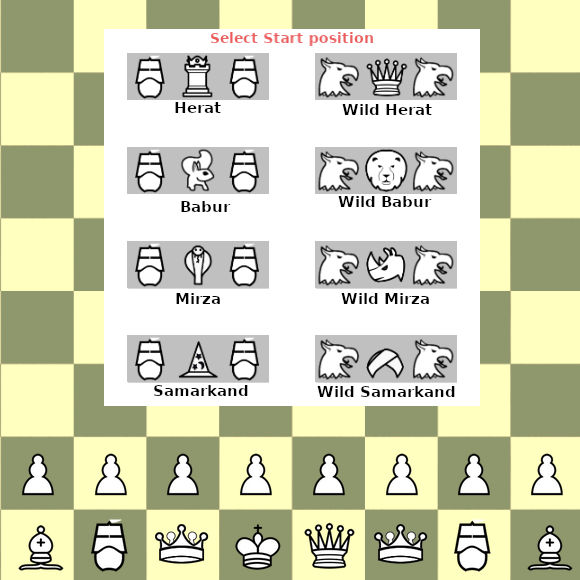
The choice of Griffons and an already promoted central piece will result in a more aggressive and undoubtedly faster game. Choosing Ships and a promotable central piece (Snake, Squirrel, Wizard, Crowned Rook) will result in a game that favors the quest for promotion.
Setup
Herat Variant : with a Crowned Rook
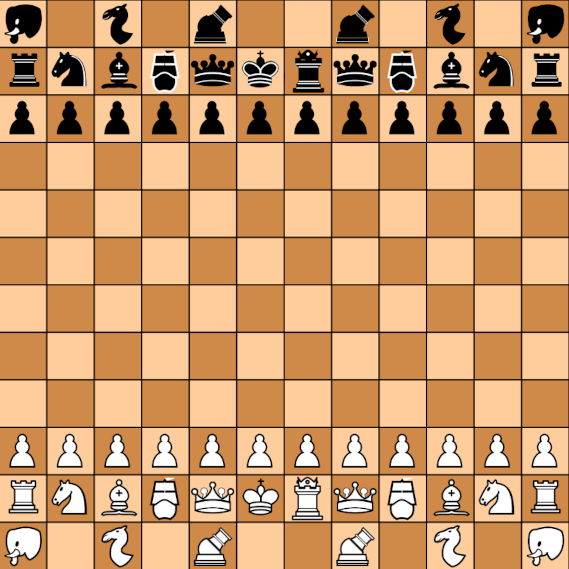
Wild Herat Variant : Ships are replaced by Griffons and the Crowned Rook is promoted to Queen

Mirza(Prince in persian) Variant : with a Snake

Wild Mirza Variant : Ships are replaced by Griffons and the Snake is promoted to a Rhino

Babur Variant : with a Squirrel
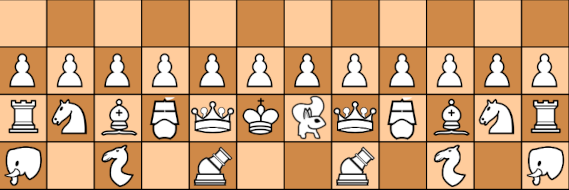
Wild Babur Variant : Ships are replaced by Griffons and the Squirrel is promoted to a Lion
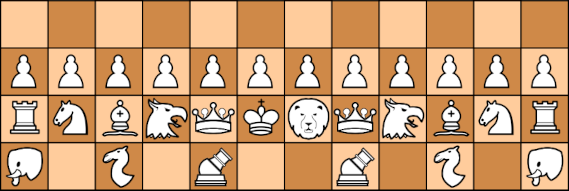
Samarkand Variant : with a Wizard
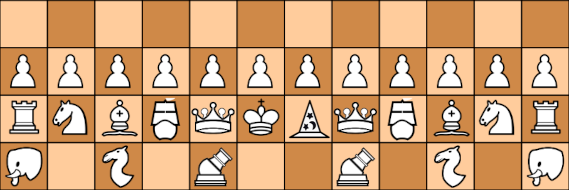
Wild Samarkand Variant : Ships are replaced by Griffons and the Wizard is promoted to an Emir
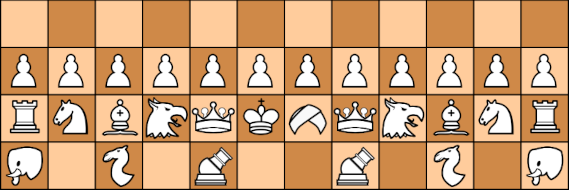
Pieces
King, Queen, Rook, Bishop, Knight: Identical to FIDE chess, except that there is no castling at Timurid.
Prince: Prince : a non-royal King who moves and captures one square in any direction. It can also move without capturing to the second square straight ahead.
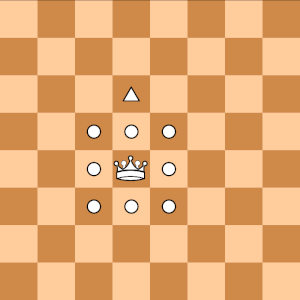
Ship: moves one square diagonally and then, goes away of an indefinite number of cases vertically, never horizontally. It can move one square diagonally only. It can not jump and must begin its move with the diagonal step. The Ship is more limited than the Griffon (which can move horizontally, see below). Nevertheless its move power is between the Rook and the Bishop.
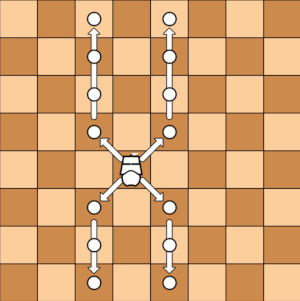
Griffon : it moves one square diagonally and then slides away an indefinite number of squares vertically or horizontally.

Cannon: exactly as in Xiangqi. The Cannon moves without taking like a Rook, but it takes by going in a straight horizontal and vertical line and jumping over exactly one piece.
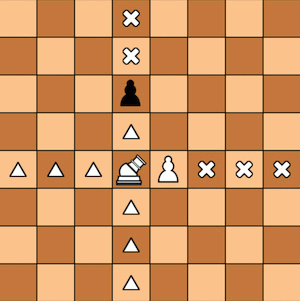
Camel: a (3,1) jumper, it jumps to the opposite square of a 2x4 rectangle, like an extended Knight. No matter what intermediate squares contain. Note that it always stays on the same color of square.
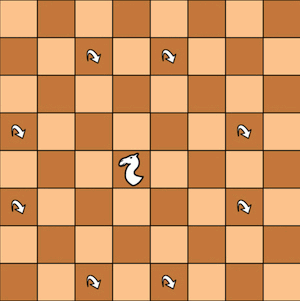
Elephant: it moves one or two squares diagonally. When an Elephant moves two squares, no matter what intermediate squares contain.
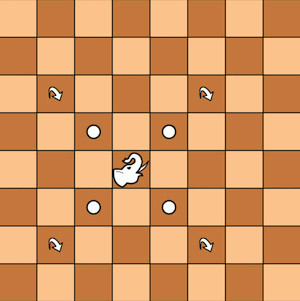
Rapid Pawn: it can move straight forward one, or two square from anywhere on the board without capturing. It captures one square diagonally forward.
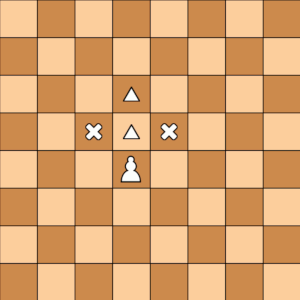
Lion : it moves as a King or may jump to a position two squares away.
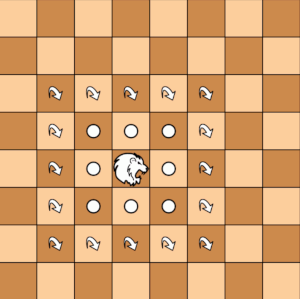
Snake : it moves one square vertically and then, slides away of an indefinite number of squares diagonally.

Rhinoceros : it moves one square vertically or horizontally and then, slides away of an indefinite number of squares diagonally.
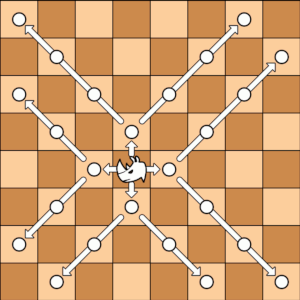
Emir : it combines the moves of the Camel, the Knight and the Ferz.
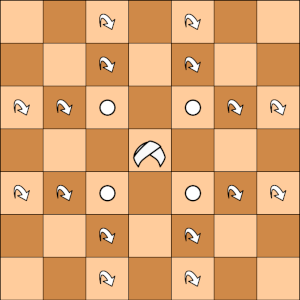
Crowned Rook : Moves as a Rook or a non-royal King.
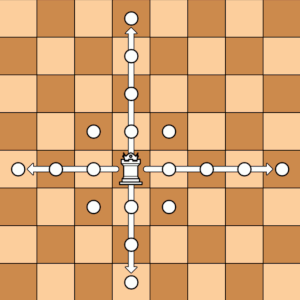
Wizard : Moves one space diagonally or leaps to a space one file and three ranks away or three files and one rank away.

Squirrel : Jumps at 2 squares.

Rules
The King's succession: A checkmated King can swap location to the position of an unthreatened prince.
Castling: There is no castling in Timurid chess.
En passant capture: Any time a Pawn or Prince takes a double step and passes through a square controlled by an opposing Pawn, that Pawn may capture the Pawn or Prince as if it has only moved one square. This en passant capture must be made on the move immediately following the double step. Only a Pawn may capture en passant; the Prince does not have this option.
Pawn promotion: When a Pawn reaches the last row on the opposite side of the board, it is promoted to a Queen of the same color and nothing else. This promotion cannot be refused.
Prince promotion: A Prince may also be promoted when reaching the last row on the opposite side of the board. The Prince is promoted to a Queen of the same color. This promotion is optional. If the promotion is refused, it may be accepted later, if the Prince moves on the last row again.
Ship promotion: When a Ship reaches one the last row on the opposite side, it is promoted to a Griffon
Crowned Rook promotion: When a Crowned Rook reaches one the last row on the opposite side, it is promoted to a Queen
Squirrel promotion: When a Squirrel reaches one the last row on the opposite side, it is promoted to a Lion
Snake promotion: When a Snake reaches one the last row on the opposite side, it is promoted to a Rhinoceros
Wizard promotion: When a Wizard reaches one the last row on the opposite side, it is promoted to an Emir
Notes
You can buy chess piece from Musketeer chess or print your own chess set from thingiverse in you have a 3D printer.
Starting position for wild timurid with some musketeerchess pieces
Starting position for wild babur with printed pieces
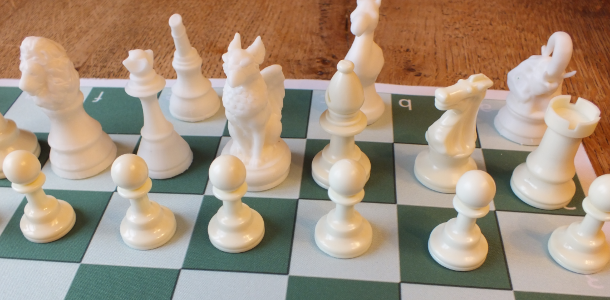
You can play online with Jocly to the timurid chess variants family
Play with Game courier :
 This 'user submitted' page is a collaboration between the posting user and the Chess Variant Pages. Registered contributors to the Chess Variant Pages have the ability to post their own works, subject to review and editing by the Chess Variant Pages Editorial Staff.
This 'user submitted' page is a collaboration between the posting user and the Chess Variant Pages. Registered contributors to the Chess Variant Pages have the ability to post their own works, subject to review and editing by the Chess Variant Pages Editorial Staff.
By François Houdebert.
Last revised by François Houdebert.
Web page created: 2023-10-24. Web page last updated: 2024-01-22
